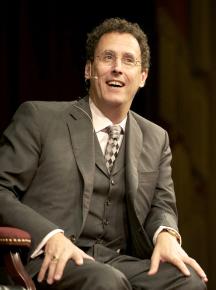No bureaucrat left behind
The controversy at CUNY over an honorary degree for Tony Kushner says a lot about our dismally low standards for university administrators, says .
THERE IS an urgent question facing our nation's public universities: How we can make it easier to get rid of bad administrators?
The dirty secret in academia is that many of our college presidents, regents and trustees are under-motivated and/or incompetent, only holding on to their jobs because of their connections to the most powerful union in the country--the ruling class.
Big deal, some of you might say. So the people running our schools are toadies and yes men. Why should we expect them to be any different than the people running the country?
Well, I'm sorry but these people are responsible for our children. I think we ought to expect a little more out of them than we do from bankers and politicians.
Besides, if we don't raise our standards for education officials, aren't we just giving in to the bigotry of low expectations? I say we challenge them to rise above their chummy and sometimes sleazy backgrounds to become genuine educators. Let's leave no bureaucrat behind.
If we fail to act, we'll see more embarrassing episodes like the recent debacle with the Board of Trustees at the City University of New York (CUNY). At a recent Board meeting, trustee Jeff Wiesenfeld made a brief statement against the awarding of an honorary degree to renowned playwright Tony Kushner based on Kushner's past criticisms of Israel.

Wiesenfeld's presentation--a selection of isolated quotes from a website unconnected to Kushner--did not meet New York's standards for middle school social studies, which demand that students support arguments with "relevant, accurate data and evidence that demonstrate an understanding of the topic or text."
Yet the Board, seemingly blown away by Wiesenfeld's intellectual firepower, voted without further comment or question to veto an honorary degree for the first time in its history.
After a public outcry, the trustees reversed their decision, but not before Wiesenfeld told the New York Times that Palestinians were "not human" and "wished death on their children." Despite the many calls for Wiesenfeld's resignation, Chancellor Matthew Goldstein insists that the trustee has "done some very good work on the board."
On what basis has Goldstein made that assessment? Is there data showing that Wiesenfeld has raised graduation rates or test scores? How can parents and students see his "value-added" impact--the measurement that we're told is so important in assessing our teachers?
There is one thing that we know that Wiesenfeld has raised. He and his colleagues have massively raised Chancellor Goldstein' salary over the past 12 years--from $250,000 to almost $600,000. Apparently, that's evidence enough of Wiesenfeld's good work.
And what about the other trustees? The ones who reacted to Wiesenfeld's sixth-grade presentation as if they had just heard a closing argument from Clarence Darrow? Some of them have admitted they had never heard of Tony Kushner, possibly the best-known living American playwright.
This raises a question: What would happen if we polled the people in charge of American higher education on their basic knowledge of relevant information about today's world? How many college presidents could locate Libya on a map? What percentage of board members could briefly explain global warming?
AMERICANS MAY not realize that to become a trustee at a public university, one does not have to take a test, present a portfolio or demonstrate proficiency in any field related to education or administration. Rather, the men and women in charge of our children's higher education need only possess the sufficient golf and ass-kissing skills necessary to be appointed to their post by a governor or mayor.
Thus, the five CUNY trustees who felt qualified to judge Kushner's ideas on Zionism included a real estate executive, a union-busting lawyer and what the Times called a former "political fixer" (that would be Wiesenfeld)--not included among them was anyone with a background in the Middle East beyond watching Fox News.
But this isn't only about educational pedigree. Board chairman Beno Schmidt was a Columbia University professor of constitutional law and president of Yale University, and yet he didn't notice any First Amendment issues in Wiesenfeld's presentation. Could there be an unacknowledged system of social promotion at work in the Ivy League allowing unqualified white men like Schmidt to rise through the ranks so that his colleagues don't have to deal with their ignorance?
I understand that we have to be sensitive to some of the specific needs of administrators. As relentless social climbers, it's important to them that they stay in sync with American foreign policy--particularly in the crucial Middle East. Sometimes, they feel the need to signal their friends in Washington, D.C., that they are "representing" and "keeping it real."
(Perhaps this explains why Schmidt and Goldstein, even as they distanced themselves from the CUNY trustees' vote, both noted their agreement with Wiesenfeld's general views--this was after the bit about Palestinians not being human.)
But while we can show understanding for these social pressures, we must firmly insist that the people running American higher education be held to at least the same standard of making a rational and substantiated claim that New York expects from its 12-year olds.


